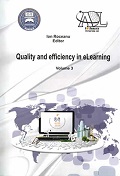USING NEW MEDIA AND TECHNOLOGIES IN FOREIGN LANGUAGE EDUCATION FOR PLURILINGUAL COMMUNICATION AND DEMOCRATIC CITIZENSHIP
USING NEW MEDIA AND TECHNOLOGIES IN FOREIGN LANGUAGE EDUCATION FOR PLURILINGUAL COMMUNICATION AND DEMOCRATIC CITIZENSHIP
Author(s): Roxana-Elisabeta MarinescuSubject(s): Education
Published by: Carol I National Defence University Publishing House
Keywords: plurilingual communication; democratic citizenship; new media and technologies
Summary/Abstract: This paper focuses on outlining some effects that the use of new media and technologies in foreign language education has on both plurilingual communication and on democratic citizenship. At the moment in the European Union there are 27 member states and 23 officially acknowledged languages. With increasingly mobile European citizens and a growing number of immigrants from non-European countries, Europe faces the challenge of providing equal opportunities to all citizens and, at the same time, ensuring that their linguistic and cultural heritage will be preserved. This paper starts from the necessity stated in some European documents that the European citizen should learn at least two foreign languages, English being in practice one of those, for better or worse. Also foreign language education is viewed in connection with citizenship rights and intercultural communication, for a European citizen fully equipped for flexible work contexts in a time of increased mobility. With ‘language rights’ viewed as part of ‘human rights’ and with Europe a multilingual area, the plurilingual European citizens should be able to make effective use of all their educational strategies in order to enhance their chances in social and economic life. European educational policies should thus take into consideration the inclusion of new media and technologies in formal education, as well as the impact they have on the informal education of European citizens, and should evaluate the extent to which the use of these e-tools affects language learning in the context of multilingualism. This paper also briefly presents an overview of the results of a small scale survey conducted within the Bucharest University of Economic Studies among first-year students by means of a questionnaire and informal discussions. The survey focuses on how they use the new media in formal and informal language learning, especially English language learning.
Journal: Conference proceedings of »eLearning and Software for Education« (eLSE)
- Issue Year: 9/2013
- Issue No: 03
- Page Range: 328-333
- Page Count: 6
- Language: English

